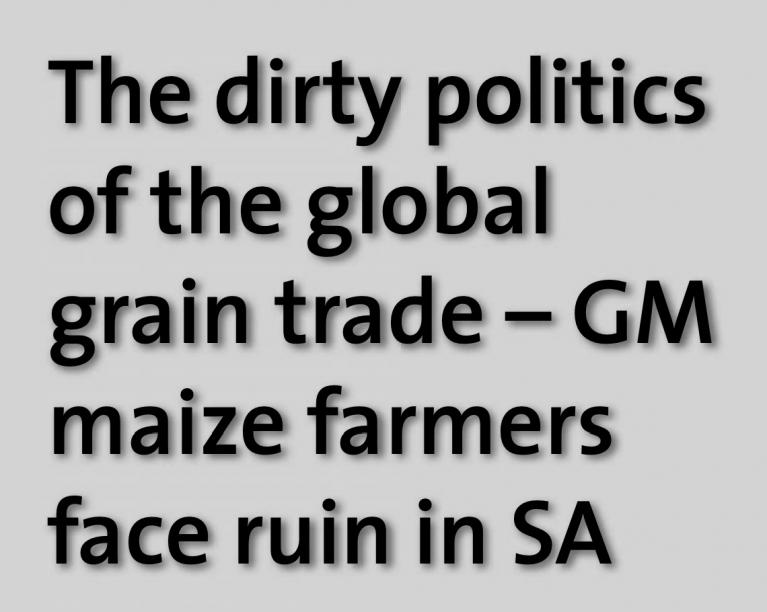Latest Resources

9 May 2011
Critique of SANBI’s Studies on Monsanto’s MON 810
During early in 2011, the South African National Biodiversity Institute (SANBI) published a report titled, Monitoring the Environmental Impacts of GM Maize in South Africa. The report was a culmination of a study by the Environmental Biosafety Cooperation Project (EBCP) aimed at developing a framework for monitoring of insect resistant maize, Mon810, belonging to Monsanto. […]

8 September 2010
The dirty politics of the global grain trade – GM maize farmers face ruin in SA
Recently, the South African press reported on the possible bankruptcy faced by maize farmers. The African Centre for Biosafety (ACB) has today released a new report titled “The dirty politics of the global grain trade – GM maize farmers face ruin in SA” which provides an analysis of why South Africa’s record 13 million ton […]

12 May 2010
Traceability, segregation and labelling of genetically modified products in South Africa: A Posit...
South Africa has promulgated national legislation, the Consumer Protection Act (CPA), which creates an opportunity for the mandatory labelling of certain foodstuffs containing or which are genetically-modified organisms (GMOs). The Act sets out a number of consumer rights that have relevance to the sale of products with genetically modified components. These include the right to […]

17 April 2010
Scottish Parliament Motion on GM entry refusal, Kenya, South Africa
*S3M-6119 Bill Wilson: Biodiversity Coalition Opposes GM Contamination. That the Parliament notes reports that 40,000 tons of genetically modified (GM) maize from South Africa have been refused entry to Kenya as a result of protests led by the Kenya Biodiversity Coalition. Further notes, with reference to motion S3M-05873 by Bill Wilson ‘Who Benefits from GM […]

7 February 2010
A profile of Monsanto in South Africa
Monsanto is a globally dominant company in the agrochemical, seed and agricultural biotechnology sector. It has been active in the agrochemicals market in South Africa since 1968, and now owns almost all traits used in the South African GM crop market. Thanks to the purchase of local seed companies, Sensako and Carnia, in the late […]

5 January 2010
Status of de facto moratorium on GM commodity clearance/import applications in SA
The South African government has granted a large number of commodity import permits over the years, enabling millions of tons of GM maize, soya and canola to be imported into South Africa. However, during September/October 2005, the Department of Trade and Industry (DTI), a member of the Executive Council (EC): GMO Act, raised several concerns […]

8 September 2009
Biotechnology, seed and agrochemicals: Global and South African industry structure and trends
Biotechnology, seed and agrochemicals global and South African industry structure and trends. Click here to read the publication.

7 August 2009
South African GM grapevine trials to go ahead
The South African authorities have given the go-ahead to the Institute of wine biotechnology, based at the University of Stellenbosch, to conduct open-air field trials of grapevines genetically modified to resist fungal disease, despite the failure of fungal resistant grapevines in German trials seven years ago. Read more here.

5 March 2008
New GM Potato Book: Executive Summary
In 2001, the South African Agricultural Research Council (ARC) began conducting field trials with potatoes genetically modified to contain a Bt gene Cry1Ia1 (formerly BtCryV). This novel gene is intended to protect the plants and potato tubers from infestations of the Potato tuber moth (Phthorimaea operculella). This research is not home grown or ‘truly South […]

13 February 2008
South Africa’s Biofuels Strategy: greenwashing agribusiness interests
The impetus for the establishment of a biofuels industry in South Africa also came from industry lobbyists under the banner of the Southern African Biofuels Association (SABA). Consequently, the South African government published a feasibility report and a draft Biofuels Industrial Strategy in 2006, which proposed the establishment of a mandatory bioethanol target of 8% […]
